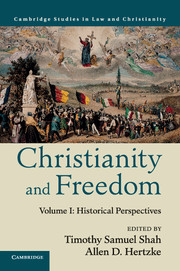Book contents
- Frontmatter
- The Religious Freedom Research Project
- Contents
- Contributing Authors
- Acknowledgments
- Introduction: Christianity and Freedom: Ancient Roots and Historical Innovations
- 1 The Roots of Religious Freedom in Early Christian Thought
- 2 The Christian Roots of Religious Freedom
- 3 Lactantius on Religious Liberty and His Influence on Constantine
- 4 Augustine and Religious Freedom
- 5 Christianity and the Roots of Human Dignity in Late Antiquity
- 6 Liberty of Conscience and Freedom of Religion in the Medieval Canonists and Theologians
- 7 Faith, Liberty, and the Defense of the Poor: Bishop Las Casas in the History of Human Rights
- 8 Calvinist Contributions to Freedom in Early Modern Europe
- 9 Constitutional Protection of the Freedom of Conscience in Colonial America: The Rhode Island and Pennsylvania Experiments
- 10 Christianity and Freedom in the American Founding
- 11 Vibrant Christian Pluralism and the Evolution and Defense of Religious Liberty in America
- 12 Orthodox Christian Contributions to Freedom: Historical Foundations, Contemporary Problematics
- 13 Christianity: A Straggler on the Road to Liberty?
- 14 Protestant Missionaries and the Centrality of Conversion Attempts for the Spread of Education, Printing, Colonial Reform, and Political Democracy
- 15 God and Freedom: Biblical Roots of the Western Idea of Liberty
- Index
12 - Orthodox Christian Contributions to Freedom: Historical Foundations, Contemporary Problematics
Published online by Cambridge University Press: 05 May 2016
- Frontmatter
- The Religious Freedom Research Project
- Contents
- Contributing Authors
- Acknowledgments
- Introduction: Christianity and Freedom: Ancient Roots and Historical Innovations
- 1 The Roots of Religious Freedom in Early Christian Thought
- 2 The Christian Roots of Religious Freedom
- 3 Lactantius on Religious Liberty and His Influence on Constantine
- 4 Augustine and Religious Freedom
- 5 Christianity and the Roots of Human Dignity in Late Antiquity
- 6 Liberty of Conscience and Freedom of Religion in the Medieval Canonists and Theologians
- 7 Faith, Liberty, and the Defense of the Poor: Bishop Las Casas in the History of Human Rights
- 8 Calvinist Contributions to Freedom in Early Modern Europe
- 9 Constitutional Protection of the Freedom of Conscience in Colonial America: The Rhode Island and Pennsylvania Experiments
- 10 Christianity and Freedom in the American Founding
- 11 Vibrant Christian Pluralism and the Evolution and Defense of Religious Liberty in America
- 12 Orthodox Christian Contributions to Freedom: Historical Foundations, Contemporary Problematics
- 13 Christianity: A Straggler on the Road to Liberty?
- 14 Protestant Missionaries and the Centrality of Conversion Attempts for the Spread of Education, Printing, Colonial Reform, and Political Democracy
- 15 God and Freedom: Biblical Roots of the Western Idea of Liberty
- Index
Summary
This chapter explores the historical foundations of Orthodox Christian contributions to freedom, by analyzing representative Orthodox teachings that originated, evolved, and consolidated during the historical epoch of the Eastern Roman, or Byzantine, Empire. The chapter responds to the editors’ request for an explicitly historical inquiry into the ways in which Orthodoxy has enriched Christianity's overall contributions to defining, disseminating, and promoting freedom in political, social, economic, and religious terms. Therefore, this chapter concentrates on Orthodox teachings drawn from the period roughly stretching from the establishment of the capital of the Eastern Roman Empire in the city of Constantinople in the early fourth century, up to the termination of the Byzantine Empire with the mid-fifteenth-century conquest of Constantinople by the Ottoman Turks.
The focus on Orthodox teachings in Byzantium, among an admittedly broad set of geographic and temporal options for meeting the editors’ charge to render accessible the “distinctly Orthodox” historical resources on freedom, requires explanation. The chapter turns on the assumption that the Byzantine period generated the template for the diffusion of fundamental Orthodox teachings on freedom that came to be refracted through and adjusted to the experience of political modernity generally identified by political scientists as the architectures of international relations that are conventionally accepted under the rubric of the Westphalian state order. Orthodox Christians understand their own religious history and faith as the unbroken continuity with the church established by Jesus Christ and disseminated and expanded by Christ's apostles. The primary doctrinal, institutional, and cultural markers and reference points for Orthodox Christianity were developed, configured, and operationalized in the Byzantine Empire. Therefore, any effort to understand the ways in which contemporary Orthodox Christian leaders and communities contribute to current debates and practices about religious and other forms of freedom in international relations must recognize that today's globalized Orthodox Church continues to draw from the wellspring of the foundational texts, practices, and experiences of Christian Byzantium.
The focus on Orthodox teachings in the Byzantine period is also consequential, both substantively and theoretically, because of the critique of the historical geography of Christianity entailed in this endeavor.
- Type
- Chapter
- Information
- Christianity and Freedom , pp. 301 - 332Publisher: Cambridge University PressPrint publication year: 2016

